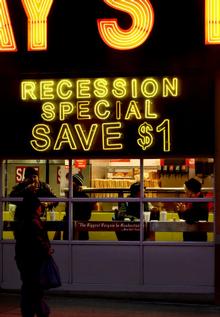GDP could fall by as much as 6 percent this quarter
 Gray’s Papaya, a hot dog and papaya store in New York’s Fashion District, serves quick, inexpensive food with stand-up dining. |
WASHINGTON — As the longest recession in a quarter century intensifies, analysts believe the small decline in economic activity in the third quarter has worsened significantly in the current fourth quarter.
The Commerce Department said Tuesday that the gross domestic product, the broadest measure of economic health, declined at an annual rate of 0.5 percent in the July-September quarter. Corporate profits fell 1.2 percent.
Some economists believe the economy’s decline in the October-December period could be as large as 6 percent. If so, that would be the worst quarterly drop since 1982.
“It will get a lot worse before it gets better,” said Nariman Behravesh, chief economist at IHS Global Insight, a Lexington, Mass., forecasting firm. “We are in the midst of the worst recession in the post-war period, even factoring in a massive stimulus program.”
GDP is likely falling at a sharper pace in the current quarter because of widening fallout from the worst financial crisis to hit the country since the Great Depression. If GDP did plunge as much as 6 percent in the fourth quarter, it would be the sharpest quarterly decline since a 6.4 percent drop in the first quarter of 1982.
Many economists think this quarter could mark the low point of the recession, which is already the longest in a quarter century, having started in December 2007.
Analysts are projecting that the huge plunge in GDP they expect in the current quarter will be followed by smaller declines in the first and second quarters of next year, before the economy starts growing again next summer. If the recession ends in June 2009, as many economists are forecasting, it would have lasted 18 months, making it the longest recession since World War II.
Evidence of the current troubles came in two other reports Tuesday showing that sales of both existing and new homes fell by more than expected in November.
The Commerce Department said new home sales dropped 2.9 percent in November to an annual sales rate of 407,000 units, the slowest pace in nearly 18 years.
Meanwhile, the National Association of Realtors said sales of previously owned homes, the far bigger part of the market, fell by 8.6 percent to an annual rate of 4.49 million units.
The median sales price of an existing home plunged 13.2 percent in November to $181,300, the biggest year-over-year drop on records dating to 1968. The median, or mid-point, price for a new home sold in November dropped by 12.7 percent to $220,400.
Sung Won Sohn, an economist at California State University, said that while the fourth quarter is likely to suffer the biggest dropoff in activity, future quarters could see sharp declines as well.
“People who think this may be a run-of-the-mill recession may be mistaken,” he said.
The 0.5 percent drop in GDP in the third quarter followed a 2.8 percent increase in the spring, a period that was boosted by the distribution of millions of economic stimulus payments.
President-elect Barack Obama favors a massive second stimulus measure of around $850 billion, which Obama is pushing Congress to pass early next year.
The National Bureau of Economic Research has said that the country slipped into a recession in December 2007. In the October-December quarter of 2007, the GDP was falling at an annual rate of 0.2 percent. GDP then grew by 0.9 percent in the first quarter and 2.8 percent in the second quarter before falling by 0.5 percent in the third quarter.
While a common rule of thumb for a recession is two consecutive quarters of falling GDP, the NBER uses other data to determine when recessions begin and end, including employment statistics. The economy has lost jobs every month since January. It’s shed 1.9 million payroll jobs this year, including more than a half-million jobs lost just in November. The unemployment rate now stands at a 15-year high of 6.7 percent.
Congress enacted a $700 billion rescue program in October, and the Federal Reserve has expanded its loan programs by hundreds of billions of dollars as the government has tried to combat the credit crisis.
Earlier this month, Memphis, Tenn.-based FedEx Corp. said it would cut pay for senior executives and freeze 401(k) contributions for a year, while AK Steel Holding Corp. of West Chester, Ohio, said it planned to reduce pay for salaried employees by 5 percent in 2009.
The recession already is the longest since the 1981-82 slump, which lasted 16 months.
By Martin Crutsinger
Wednesday, December 24, 2008
Source: AP